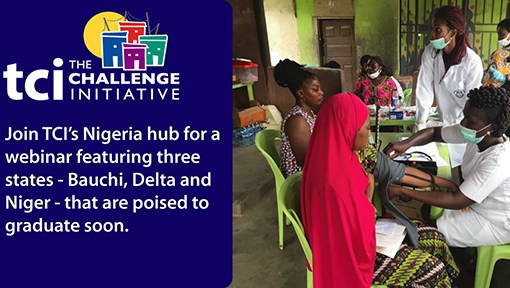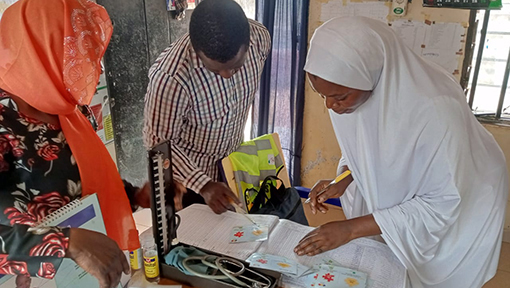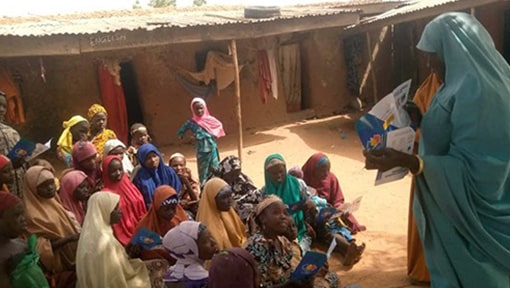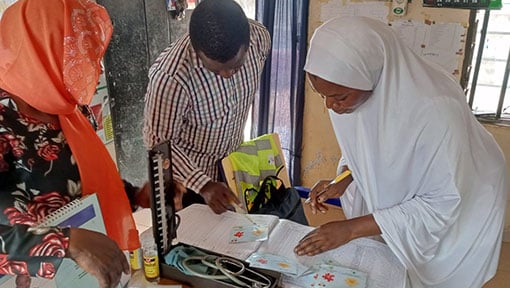Webinar Offers Lessons from Three TCI Graduating States in Nigeria: Bauchi, Niger and Delta
 The Challenge Initiative (TCI) hosted a webinar on June 3, 2021, that featured three states poised to “graduate” from TCI’s direct support in Nigeria: Bauchi, Niger and Delta. The webinar highlighted TCI’s success in supporting the local governments in all three states to implement high-impact family planning interventions. It also included a discussion of the states’ political commitment to and financial support of family planning. These three graduating states can now serve as mentors to new states joining TCI. When a state graduates, TCI is no longer involved in day-to-day support of the local government but will be available for on-demand coaching. Nearly 100 people attended the webinar from over eight countries including Nigeria, India, Liberia, Kenya, Philippines, Senegal, Uganda and the United States.
The Challenge Initiative (TCI) hosted a webinar on June 3, 2021, that featured three states poised to “graduate” from TCI’s direct support in Nigeria: Bauchi, Niger and Delta. The webinar highlighted TCI’s success in supporting the local governments in all three states to implement high-impact family planning interventions. It also included a discussion of the states’ political commitment to and financial support of family planning. These three graduating states can now serve as mentors to new states joining TCI. When a state graduates, TCI is no longer involved in day-to-day support of the local government but will be available for on-demand coaching. Nearly 100 people attended the webinar from over eight countries including Nigeria, India, Liberia, Kenya, Philippines, Senegal, Uganda and the United States.
The webinar’s moderator – Dr. Lekan Ajijola, Deputy Director of TCI in Nigeria – kicked off the discussion with a history of TCI’s efforts thus far in Nigeria before posing critical questions to representatives from all three graduating states. See excerpts from the conversation below:
What has changed in government leadership for family planning programs in Bauchi State over the past few years?
Before there was not a lot of capacity for family planning, teamwork or coordination of services. Data gathering was also weak. With TCI, we learned about makeovers and whole-site orientation, quality improvement, and social mobilization with in-reaches and outreaches. These interventions were scaled up by the state. Changes include consistent release of funding and increased budget lines for FP from 17 million Naira to 140 million Naira annually. TCI contributed to a 53% increase in FP client volume, representing over half of the FP clients in Bauchi state. 98% of that increase are long-acting reversible contraceptive acceptors. Bauchi state has taken over the makeover activity as well, with plans to makeover an additional 25 PHCs (primary healthcare centers).”
– Dr. Rilwanu Mohammed, Executive Chairman, Bauchi State Primary Health Care Development Agency (BSPHCDA)
Which high-impact FP interventions worked best that Delta State will continue to implement without TCI support?
TCI-supported coordination of partners working in the reproductive health space, and now the coordination meetings are driven by the state and implementation challenges are resolved quickly. Health facility in-reaches so clients don’t have to pay for services received in Delta state and now the RH coordinators are leading them. Through coaching and mentoring of state data reporting officers, the quality of monitoring and evaluation has improved, and this will continue to be worked on. TCI-trained community mobilizers to conduct neighborhood campaigns that refer women and adolescents to health facilities and these campaigns are ongoing.”
– Dr. Philomena Okeowo, Director of Public Health, Delta State Primary Health Care Development Agency
How has the FP funding landscape changed in Delta State and what role did the Advocacy Core Group (ACG) play?
The main goals of the ACG were to advocate for a FP budget line in Delta State, increase number of decision-makers in favor of FP and enact FP friendly policies. A separate FP budget line that was initially non-existent was created and increased from 8 million Naira to 20 million Naira. Currently, the ACG is working towards a higher budget and timely release. Family planning champions have been identified in the communities from religious clerics, local leaders and the governor’s wife, and these strong relationships will be maintained.
– Barrister Rachael Obodo-Obunseli, Delta State Chairperson of ACG
What has been the most valuable experience working with TCI?
The 72-hour clinic makeover: Before facilities didn’t have conducive FP units with adequate privacy and FP wasn’t a priority for government. Now FP is seen as a priority and the new FP spaces in facilities are private and confidential so even adolescents come. Overall, client flow has greatly increased thanks to TCI approaches of in-reaches, social mobilization and integration. With services free of charge [during in-reach days], better trained providers locally and reduced stigma of going to health centers, people have taken ownership of their health and taken advantage of the convenience.”
– Dorcas Talatu Abu, Niger State FP Coordinator
What government structures will continue to support the FP gains in Bauchi state?
The state now has a recurrent budget line for FP as a result of the efforts of the ACG. The annual operational plan will coordinate partners, activities and funding commitments so that there is no duplication of efforts and a reduction in waste of funds. Starting at the state level, the technical working group tracks implementation and resolves challenges and gaps and supportive supervision and on-the-job training ensures community members are satisfied by the quality of services. The 72-hour clinic makeover has increased client flow to the newer and friendlier spaces and, if a service is unavailable, a referral mechanism has now been established. These interventions don’t need excessive funding to be successful and are led by the state government agency.”
– Hajiya Hajara Yahaya, Bauchi State FP Coordinator
What are Niger state’s plans to sustain FP gains using data for decision-making?
We will leverage the existing structure for supportive supervision and on-the-job training to conduct more trainings in the same time period. With Data Quality Assurance and electronic data entry, we will be able to keep up with the pace of work. I do recommend expanding TCI model and proven approaches to more LGAs in the state to ensure greater coverage and sustained FP gains.”
– Abraham Bako, Niger State Monitoring & Evaluation Officer
Watch a recording of the webinar below:






